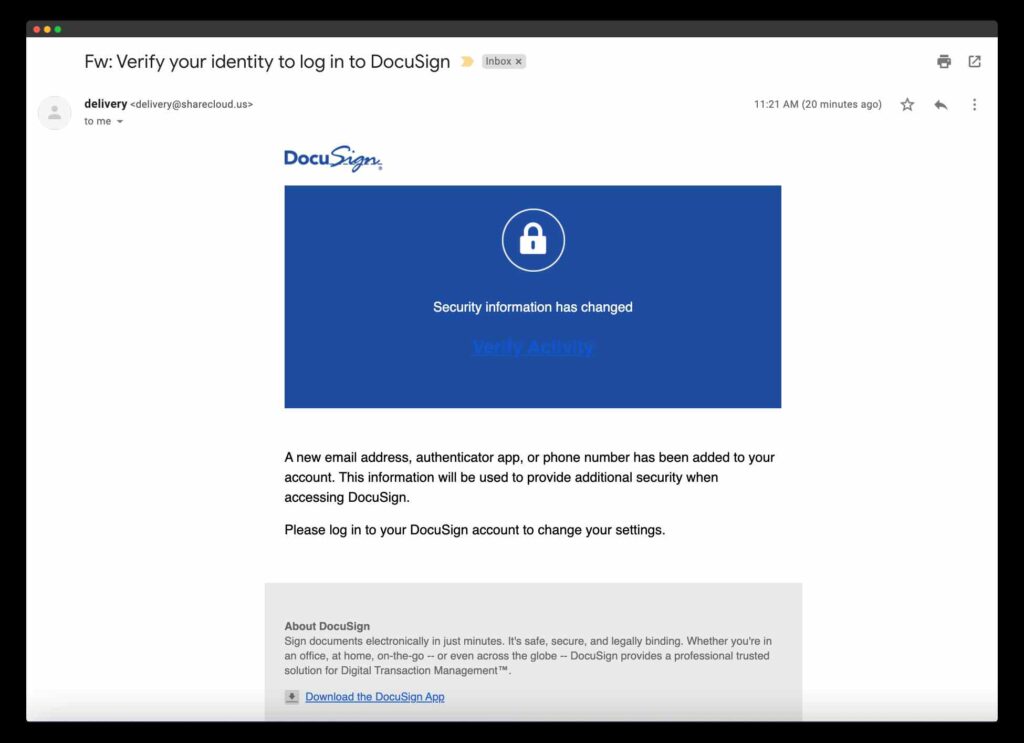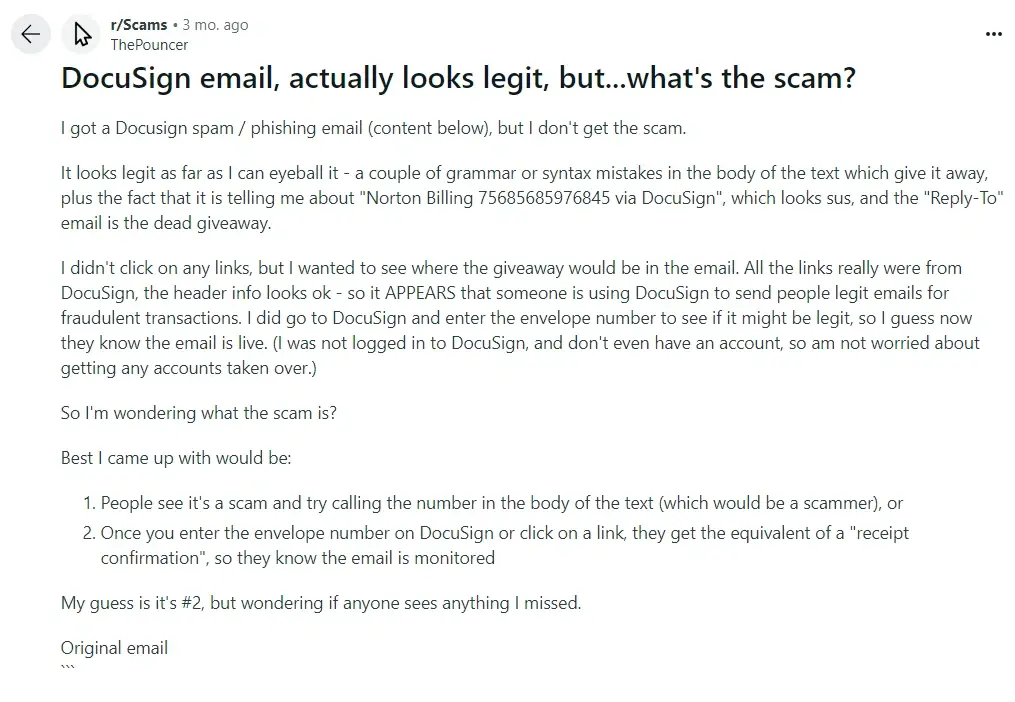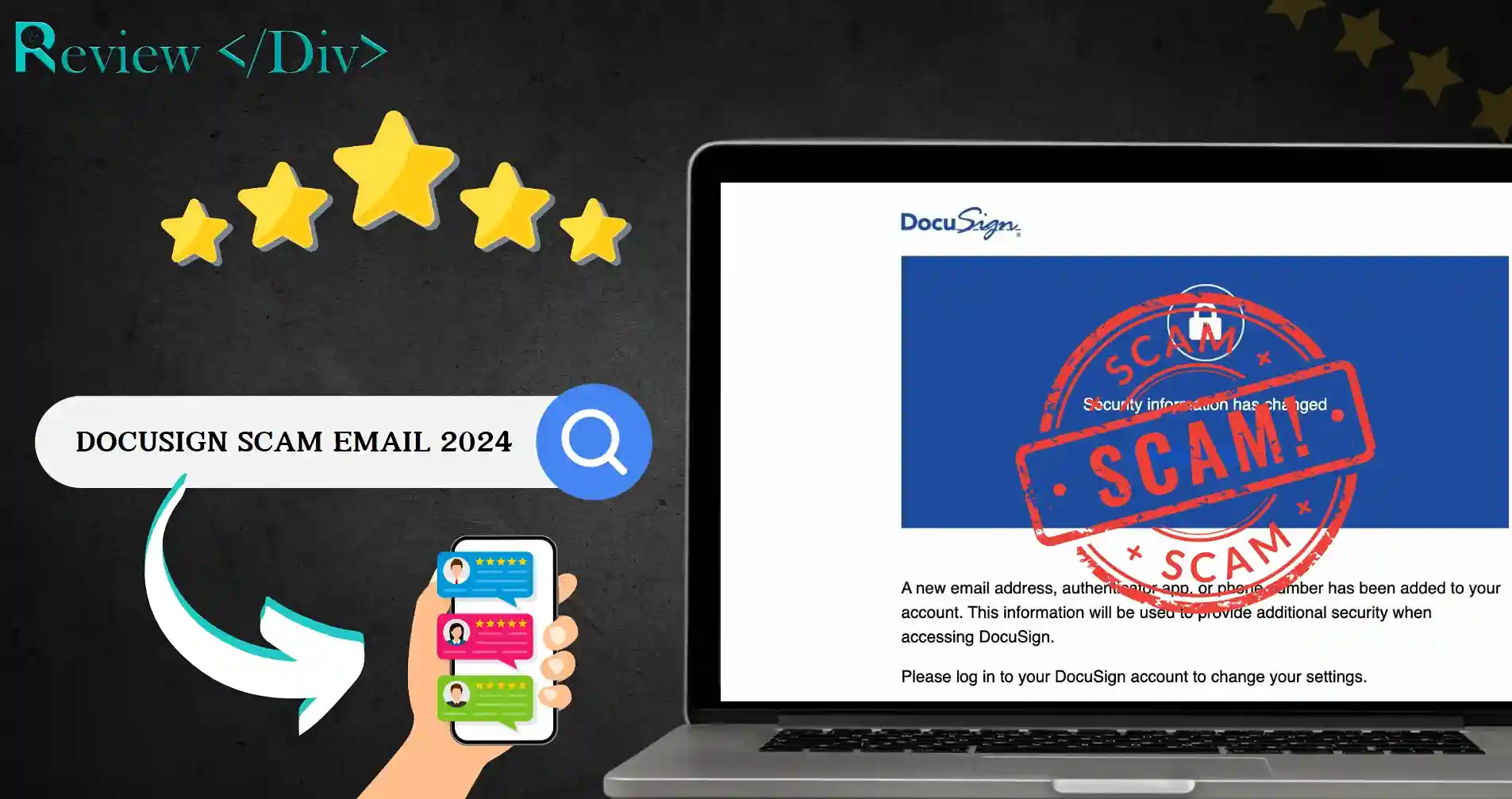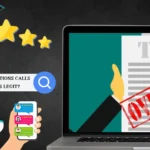Nowadays, where electronic communication is important for both personal and professional interactions, cybercriminals are constantly growing their tactics to use unsuspecting individuals.
One such tactic is the rise of DocuSign scam emails and deceptive messages that copy the trusted electronic signature service to steal sensitive information.
In this post, we will review DocuSign Scam Email, how this scam works, and what to do if you fall for DocuSign Scam Email.
What is DocuSign Scam Email?
A DocuSign scam email is a fraudulent attempt by cybercriminals to copy the legitimate DocuSign service, which is used for electronic signatures. These emails are designed to trick recipients into providing sensitive information, such as personal identification details, financial information, or login credentials.
As more people depend on digital platforms for signing documents, the number of such scams has increased. Falling victim to these phishing attempts can lead to severe results, such as identity theft, financial loss, and unauthorized access to personal accounts.
How DocuSign Scam Email Works?
DocuSign scam emails follow a structured pattern to increase their chances of success. Here’s how it works.
1. Fake Email Addresses
Scammers use email addresses that closely resemble legitimate ones, making it difficult for recipients to notice the difference. For instance, an email comes from “[email protected]” instead of a legitimate “@docusign.com” domain.
2. Sense of Urgency
The emails are crafted with subject lines and messages that create a sense of urgency, urging recipients to act quickly without thoroughly investigating the email.
3. Phishing Links and Attachments
These emails contain links or attachments that direct the recipient to fraudulent websites designed to look like the DocuSign login page or other legitimate DocuSign interfaces. Once on these sites, users are prompted to enter their login credentials, which are then captured by the scammers.
4. Visual Similarity
The emails are meticulously designed to simulate DocuSign’s official branding, including logos, color schemes, and language. This visual similarity can easily deceive even careful users who do not notice slight inconsistencies.
DocuSign Phishing Email Example
DocuSign phishing emails are a common type of cyber scam designed to trick individuals into revealing personal information. Here’s an example of what such a phishing email looks like.

DocuSign Scam Email Reddit
There are many discussions on DocuSign Scam Emails that take place on Reddit. Many users have reported receiving emails that appeared legitimate at first glance.

For instance, one user noted receiving a DocuSign email that looked suspicious but was wary enough not to click any links. They pointed out that the email contained grammar mistakes, which often serve as red flags for phishing attempts.
What to Do If You Fall for a DocuSign Scam Email
If you suspect that you have fallen victim to a DocuSign scam email or similar scam, it is important to act quickly to minimize harm. Here’s what you should do.
Avoid Further Interaction: If you have clicked on a suspicious link or opened an attachment, stop any further interaction with the email. Close it immediately to prevent accidental exposure to more threats.
Change Your Passwords: If you have entered your credentials on a fraudulent site, change your passwords immediately. This includes not only your DocuSign password but also any other accounts that may be linked to the compromised information.
Check Your Accounts: Regularly check your bank and credit card statements for any unauthorized transactions. If you notice any suspicious activity, report it to your financial institution right away.
Report the Scam: Forward the suspicious email to DocuSign at [email protected]. Additionally, report the phishing attempt to the Federal Trade Commission (FTC) at reportfraud.ftc.gov.
Use Security Software: Check that you have up-to-date antivirus and anti-malware software installed on your devices. This software can help detect and block malicious emails and websites, providing an additional layer of protection.
FAQs
To verify if a DocuSign email is legitimate, check the sender’s email address for the official “@docusign.com” domain, look for any spelling or grammatical errors, and avoid clicking on links—use DocuSign’s official website to access documents directly instead.
Legitimate DocuSign emails come from addresses ending in @docusign.com. Always verify the sender’s email address carefully, as scammers often use similar-looking addresses to deceive recipients.
If you keep receiving DocuSign emails, it could be due to someone mistakenly using your email address for legitimate documents, or you may be targeted by phishing scams. It’s important to verify the sender and avoid interacting with suspicious emails.
Laura Kemmis is a passionate trendsetter and reviewer, dedicated to researching the latest scams and frauds while sharing her insights with the world. She provides valuable information to keep her audience aware and informed about the latest scams. Additionally, Laura discovers and analyzes trends in fashion, technology, and lifestyle, offering a fresh and honest perspective in her reviews.







